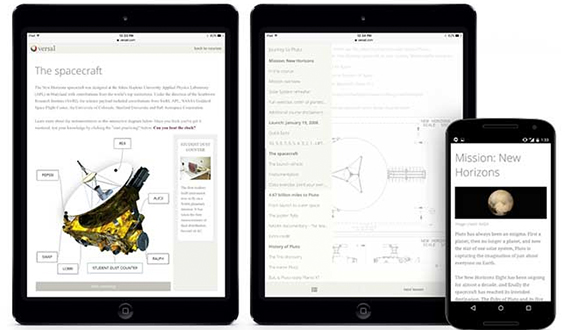
Online learning platform Versal has overhauled its mobile website to provide a better learning experience on smartphones and tablets.
Versal allows anyone to make an interactive online course for either academic or business purposes, which can be then hosted on the platform, embedded in a website, and/or integrated with popular Learning Management Systems.
With the new increased mobile compatibility, the Versal site is optimized for small touch screens. For example, the table of contents is expandable so that students can focus on the content instead. Its interactive “gadgets” will also now work on mobile, allowing students to access the more engaging elements of the courses and test their knowledge. These changes are applicable to both iOS- and Android-powered devices.
According to Versal’s website:
We’ve always envisioned mobile learning to be an integral part of our product. In the corporate environment, employees can learn something new while commuting to work or while staffing a remote office that doesn’t have broad computer access (for example, in a retail environment).
In schools, the effect is even more profound. Too many campuses still lack dedicated computers for each class, and teachers can’t always count on a student to have a computer at home. But when we talk to teachers, one consistent theme we hear is this: most students have smartphones and/or tablets, and this ‘app generation’ responds very well to interactive online learning experiences.
With a free account, users can add text, videos, images, exercises, links, and assessments to public courses and embed them in other sites if they wish, writes David Nagel of Campus Technology. Teachers, schools, and businesses who pay for premium service also have the option of creating private courses, tracking students, and integrating with compatible Learning Management Systems like Google Classroom. No knowledge of coding is necessary to create a course, and any changes are automatically saved to prevent the loss of work due to technology malfunction. Educators can also work together to co-author a course.
Recently, the Versal platform added Javascript-based “gadgets” which enhance the interactivity of courses. These customizable tools are open to any user, and include more than 1,000 demonstrations, dynamic graphs, timelines, vocabulary flashcards, slideshows, 3D models, maps, games, diagrams, quizzes, and presentations. The catalog includes some tools made by Versal and others made by users. Teachers can also rate and comment on the gadgets so that creators have feedback to use to improve.
Versal co-founder and CEO Gregor Freund said:
Creating online courses and lessons can be time-intensive, yet the Internet offers a great opportunity for teachers to collaborate with their peers. That’s the vision behind the Gadget Market.
Versal, which was founded in 2012, is also partnering with Wolfram Research, who will provide math exercises for the Gadget Market.




